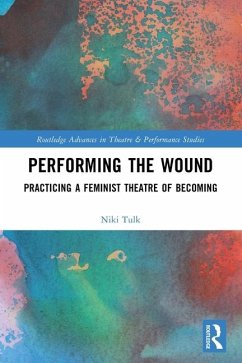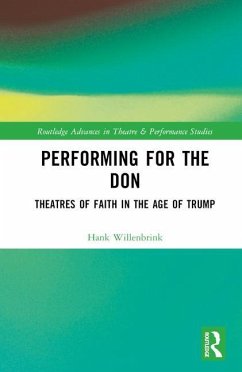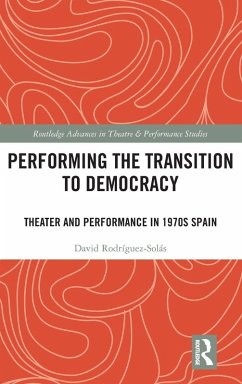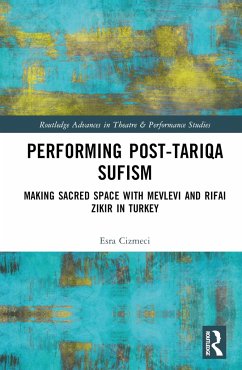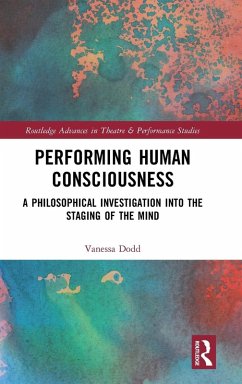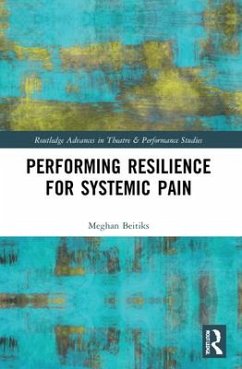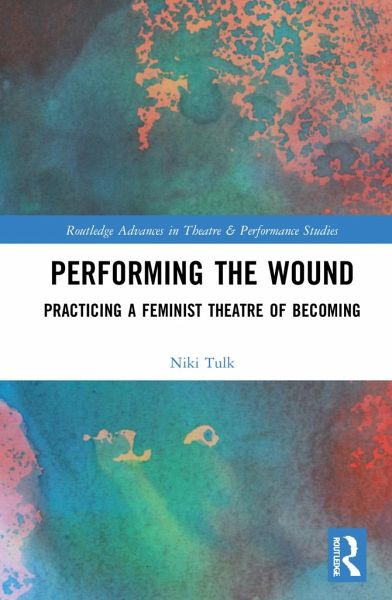
Performing the Wound
Practicing a Feminist Theatre of Becoming
Versandkostenfrei!
Versandfertig in 6-10 Tagen
154,99 €
inkl. MwSt.
Weitere Ausgaben:

PAYBACK Punkte
77 °P sammeln!
This book offers a matrixial, feminist-centered analysis of trauma and performance, through examining the work of three artists: Ann Hamilton, Renée Green, and Cecilia Vicuña.Each artist engages in a multi-media, or "combination" performance practice; this includes the use of site, embodied performance, material elements, film, and writing. Each case study involves traumatic content, including the legacy of slavery, child sexual abuse and environmental degradation; each artist constructs an aesthetic milieu that invites rather than immerses-this allows an audience to have agency, as well as ...
This book offers a matrixial, feminist-centered analysis of trauma and performance, through examining the work of three artists: Ann Hamilton, Renée Green, and Cecilia Vicuña.
Each artist engages in a multi-media, or "combination" performance practice; this includes the use of site, embodied performance, material elements, film, and writing. Each case study involves traumatic content, including the legacy of slavery, child sexual abuse and environmental degradation; each artist constructs an aesthetic milieu that invites rather than immerses-this allows an audience to have agency, as well as multiple pathways into their engagement with the art. The author Niki Tulk suggests that these works facilitate an audience-performance relationship based on the concept of ethical witnessing/wit(h)nessing, in which viewers are not positioned as voyeurs, nor made to risk re-traumatization by being forced to view traumatic events re-played on stage. This approach also allows agencyto the art itself, in that an ethical space is created where the art is not objectified or looked at-but joined with. Foundational to this investigation are the writings of Bracha L. Ettinger, Jill Bennett and Diana Taylor-particularly Ettinger's concepts of the matrixial, carriance and border-linking. These artists and scholars present a capacity to expand and articulate answers to questions regarding how to make performance that remains compelling and truthful to the trauma experience, but not re-traumatizing.
This study will be of great interest to students and scholars of performance studies, art history, visual arts, feminist studies, theatre, film, performance art, postcolonialism, rhetoric and writing.
Each artist engages in a multi-media, or "combination" performance practice; this includes the use of site, embodied performance, material elements, film, and writing. Each case study involves traumatic content, including the legacy of slavery, child sexual abuse and environmental degradation; each artist constructs an aesthetic milieu that invites rather than immerses-this allows an audience to have agency, as well as multiple pathways into their engagement with the art. The author Niki Tulk suggests that these works facilitate an audience-performance relationship based on the concept of ethical witnessing/wit(h)nessing, in which viewers are not positioned as voyeurs, nor made to risk re-traumatization by being forced to view traumatic events re-played on stage. This approach also allows agencyto the art itself, in that an ethical space is created where the art is not objectified or looked at-but joined with. Foundational to this investigation are the writings of Bracha L. Ettinger, Jill Bennett and Diana Taylor-particularly Ettinger's concepts of the matrixial, carriance and border-linking. These artists and scholars present a capacity to expand and articulate answers to questions regarding how to make performance that remains compelling and truthful to the trauma experience, but not re-traumatizing.
This study will be of great interest to students and scholars of performance studies, art history, visual arts, feminist studies, theatre, film, performance art, postcolonialism, rhetoric and writing.




